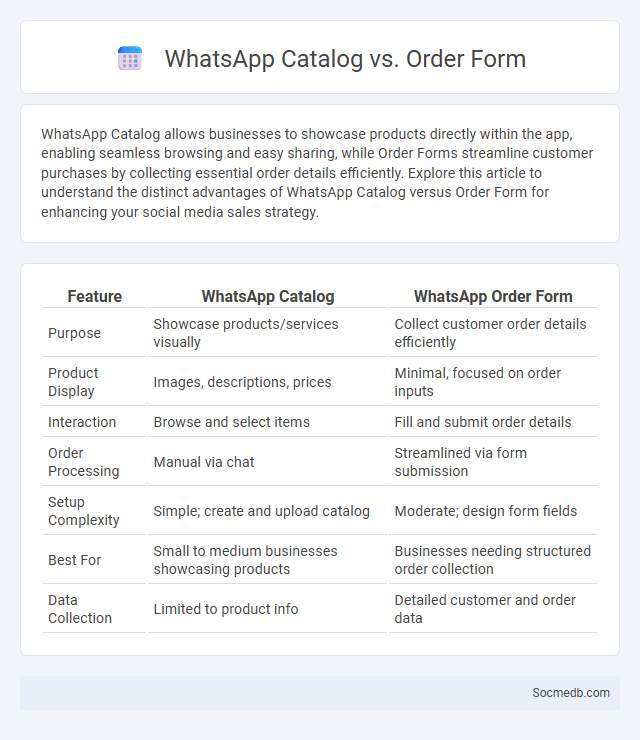
Photo illustration: WhatsApp Catalog vs Order Form
WhatsApp Catalog allows businesses to showcase products directly within the app, enabling seamless browsing and easy sharing, while Order Forms streamline customer purchases by collecting essential order details efficiently. Explore this article to understand the distinct advantages of WhatsApp Catalog versus Order Form for enhancing your social media sales strategy.
Table of Comparison
| Feature | WhatsApp Catalog | WhatsApp Order Form |
|---|---|---|
| Purpose | Showcase products/services visually | Collect customer order details efficiently |
| Product Display | Images, descriptions, prices | Minimal, focused on order inputs |
| Interaction | Browse and select items | Fill and submit order details |
| Order Processing | Manual via chat | Streamlined via form submission |
| Setup Complexity | Simple; create and upload catalog | Moderate; design form fields |
| Best For | Small to medium businesses showcasing products | Businesses needing structured order collection |
| Data Collection | Limited to product info | Detailed customer and order data |
Introduction to WhatsApp Catalog, Order Form, and Catalog
WhatsApp Catalog enables businesses to showcase products directly within the app, making it easier for customers to browse offerings without leaving the conversation. The Order Form streamlines the purchasing process by allowing Your customers to submit product selections and details seamlessly through WhatsApp. This integrated Catalog and Order Form solution enhances customer engagement and boosts sales efficiency on social media platforms.
Understanding WhatsApp Catalog
WhatsApp Catalog allows businesses to showcase their products and services directly within the app, enabling seamless customer browsing and inquiries. Each catalog item includes images, descriptions, prices, and product codes, enhancing user engagement and purchase intent. This feature integrates with WhatsApp Business, improving sales opportunities by offering a convenient, in-app shopping experience.
Exploring WhatsApp Order Form
WhatsApp Order Form streamlines customer service by enabling users to place orders directly through WhatsApp's messaging platform, enhancing convenience and engagement. Leveraging WhatsApp's API integration, businesses can automate order collection, track requests, and provide instant responses, boosting sales efficiency. This tool is particularly effective for small and medium enterprises seeking direct communication channels and real-time order management without complex web interfaces.
What Is a Product Catalog?
A product catalog in social media refers to a structured collection of product information, including images, descriptions, prices, and availability, used to showcase items directly on platforms like Facebook, Instagram, and Pinterest. It enables businesses to create dynamic ads, personalized shopping experiences, and seamless integration with e-commerce stores. Optimized product catalogs improve user engagement, targeting precision, and drive higher conversion rates by presenting relevant products to potential customers.
Key Features Comparison
Social media platforms differ significantly in key features such as user engagement options, content formats, and privacy controls. Facebook emphasizes community building with extensive group functions and multimedia sharing, while Instagram prioritizes visual content through photos, stories, and reels, enhancing creative expression. Understanding these distinctions helps you select the platform best suited to your communication goals and audience interaction preferences.
Ease of Use and Setup
Social media platforms are designed for ease of use and quick setup, enabling You to create profiles, connect with friends, and share content effortlessly. Intuitive interfaces and guided onboarding processes minimize technical barriers, making social networking accessible for all skill levels. Streamlined account creation and integrated tutorials ensure rapid engagement without complex configurations.
Customization and Flexibility
Social media platforms offer extensive customization options, allowing users to tailor their profiles, content feeds, and privacy settings to match personal preferences and interests. Flexible algorithms adapt to user behavior, delivering personalized content that enhances engagement and user experience. Advanced customization tools empower businesses to target specific demographics and optimize marketing strategies effectively.
Suitability for Different Business Types
Social media platforms offer tailored advantages for various business types, with Instagram excelling for visually-driven brands such as fashion and food industries, while LinkedIn suits B2B companies focusing on professional networking and lead generation. Small local businesses benefit from Facebook's community engagement tools and targeted advertising, whereas startups and tech companies leverage Twitter for real-time updates and industry conversations. Choosing the right platform depends on the business goals, audience demographics, and content format preferences for optimal marketing success.
Pros and Cons Analysis
Social media platforms enable instant communication, global connectivity, and powerful marketing opportunities, significantly benefiting personal branding and business growth. However, excessive use can lead to privacy issues, misinformation spread, and mental health challenges like anxiety and depression. Balancing engagement with critical awareness is essential to maximize advantages while minimizing risks in the digital landscape.
Which Option Is Best for Your Business?
Choosing the best social media platform for your business depends on your target audience, industry, and marketing goals. Facebook offers broad reach and versatile advertising, Instagram excels in visual content for lifestyle brands, while LinkedIn is ideal for B2B connections and professional networking. Analyzing audience demographics and engagement metrics ensures effective platform selection to maximize ROI and brand visibility.
 socmedb.com
socmedb.com